Peter MALONE
Woman Hater
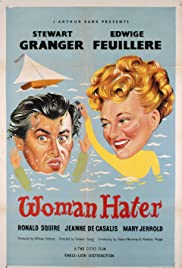
WOMAN HATER
UK, 1948, 96 minutes, Black-and-white.
Stewart Granger, Edwige Feuilliere, Ronald Squire, Jeanne De Casalils, David Hutcheson, Mary Jerrold, Miles Malleson, Michael Medlin, W.A.Kelly, Valentine Dyall, Irene Handl, Peter Bull, Dandy Nichols, James Hayter.
Directed by Terence Young.
This is a romantic comedy, British 1948 style. Contemporary audiences may find it too much embedded in its period, British filmmaking after the end of World War II.
The film was an opportunity for celebrated French actress, Edwige Feuilliere, to appear in an English language film. She seems at ease in her role but, perhaps, not in the film as a whole. However, the leading man is Stewart Granger, his usual well spoken, good-mannered English gentleman. However, he is required to play comedy, some pratfalls (including being knocked out and his eyes crossing, not convincingly). There is a very strong supporting cast of popular British character actors of the period. And the film was directed by Terence Young who, 14 years later, would become celebrated with directing Dr No.
The film has a screenplay with touches of the light, even the flippant. And Edwige Feuilliere portrays a celebrated French actress visiting London who decides that she wants to step out of the limelight, write something about her experiences with men, condemning them. She is attended by her maid, Jeanne De Casilis. Stewart Granger plays the Lord of the Manor, irritated by the attention given to the actress, offering her a retreat at his country mansion, and then pretending to be the man in charge of the estate rather than himself. Each of them takes an instant dislike to the other. He is supported in his shenanigans by the butler, comedy from Ronald Squire,
There are various misunderstandings. Eventually, there is a baptism in the estate Chapel and the actress discovers the truth. She has various tantrums, pretending to capsize in the lake for him to come to her rescue, he being knocked out and she rescuing him. She also does a sleepwalking turn causing a rumpus in his room. Eventually, left alone in the house at night, romantic music, dancing, he proposes and she reveals her intentions.
Needless to say, a lot of sorting out to be done, his feelings being hurt, she repentant, setting up a similar drowning rescue scenario.
More for film historians or for those interested in the history of British romance and comedy, or the career of Stewart Granger.
Last Full Measure, The
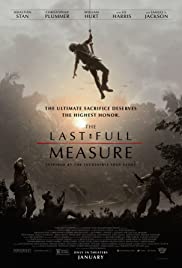
THE LAST FULL MEASURE
US, 2020, 116 minutes, Colour.
Sebastian Stan, William Hurt, Samuel L.Jackson, Christopher Plummer, Ed Harris, Peter Fonda, John Savage, Linus Roache, Bradley Whitford, Dale Dye, Jeremy Irvine, Amy Madigan, Diane Ladd, Alison Sudol, Lisa Gay Hamilton, Ser’ Darius Blain, Asher Miles Falica.
Directed by Todd Robinson.
Cinema release in the US in February 2020, just as Covid-19 hit. Then to Netflix. A Vietnam story, a very strong cast. The title is a quotation from Abraham Lincoln, from the Gettysburg Address, a reference to self-sacrifice in war, “the last full measure of devotion�.
This is a very moving film about men fighting in Vietnam, young men, out in the fields, ambushed, sudden deaths, injuries, helicopter rescue. But they are flashbacks because this is a story of 1999, an attempt to persuade the American government to award a Medal of Honour to a young man, Bill Pitsenbarger, who had given his last full measure of devotion in the field. A true story, from 1966-1999.
The screenplay uses a powerful device to draw in audiences. There has been a 32 year gap between action and this final request for the medal. There have been barriers, silences, cover-ups. And, once more, a weary application. A young man in a Pentagon office, Scott Huffman (Sebastian Stan), finds that he is assigned to this case. He is not particularly interested. There is to be a change of Secretary for his office. He is concerned about his own career and future, his wife and son. We are not particularly impressed by him.
But, as he meets some of the veterans, meet the parents of the hero, is touched by his experiences in his encounters, thes audience begin to identify with him much more, want to get to know the situation more, and, as each of the vets has nightmares, important flashbacks, we begin to appreciate who the young man was, his actions and decisions, his motivations, his willingness to give up his life for others. The whole narrative becomes something of a mission, of a quest.
Once again, the cast. Quite a collection of veterans, solid actors for the 1999 sequences, Samuel L Jackson, withdrawn and fishing with his grandchildren; Ed Harris, looking rather emaciated, surviving; a shellshocked Peter Fonda, unable to sleep at night because of his memories and frightening dreams; William Hurt, part of the helicopter rescue squad, haunted by his efforts to persuade the young hero to come back to safety; John Savage, now retired to Vietnam, creating a sanctuary on the very grounds where the fatal operation took place.
And, most movingly, a dignified performance by Christopher Plummer as he was turning 90, the young man’s father, battling terminal cancer, hoping for some kind of honour and vindication, Diane Ladd playing his wife.
A blogger remarked that they wanted more detail about the heroic young man. Rather, it seems better that we share the experience of Scott Huffman on his quest, gradually learning more and more, building up a final, more rounded, picture which made sense of the heroism.
But, at the end, we come back to the bureaucracy, political ambitions, neglect by officers in bringing forward the truth, some snobbery concerning mere ordinary soldiers. The screenplay is certainly no advocate of ambitious bureaucracy which lacks a sense of humanity.
A significant re-visiting of American action in Vietnam, irrespective of whether one was in favour of the war or not, a story of men in war, limitations and strengths, responsibilities, suffering, injury and death, heroism in rescue, heroism in bonding with men under fire, willingness to die. The final award ceremony is significant but is highly emotional. Many bloggers mentioned their tears.
1. Title? The quote from the Gettysburg address, Lincoln on the last full measure of devotion, self-sacrifice in war?
2. Inspired by a true story, the experience of the Vietnam war? The photos, video clips and quotations during the final credits?
3. The scope and strength of the cast?
4. The device of Scott Huffman and the investigation? The device of audiences identifying with Scott, the job, his increasing involvement, clues, tracks, revelations? The audience experiencing the flashbacks and the experience of the war and ambush? The audience gradually appreciating the heroism and the experiences as Scott discovered more about the war, veterans – and about himself?
5. 1966, the restaging of the battles, the mission, the soldiers on the ground, the air rescue, the ambush, injuries and deaths, the communication with the authorities, the audience seeing the war in close-up, gradually understanding and appreciate more as Bill Pitsenbarger was seen?
6. Bill Pitsenbarger in himself, the audience learning the background, the air force, the mission, his decision to go down into the field, his work with the wounded, the bodies and their being lifted into the helicopter, his interactions with the men, his staying on the ground, getting the gun, going out of the field, his death?
7. 1999, the issue of the Medal, 32 years in request? The documents at the Pentagon? Tully and his visit, his character, interactions with Scott, the continued challenge, his work as a palliative nurse over the decades?
8. Scott, audience identification with him, the opening, being busy, at home, his wife and son, her pregnancy? At the office, the changes in the Pentagon, his change of job, preparing budgets? Stanton and his friendship, their interactions, discussions about the future? Scott and his visit with the outgoing Secretary, the issues? His unwillingness to be involved, a job, sense of duty, detached? Information, loss of documents?
9. The transition from Scott’s experience of a job to get done, to a quest, the audience sharing his quest?
10. The visit to the various veterans, the insertion of the flashbacks, indications of their characters, the situations, under fire, injuries, the rescues, their personal memories and flashbacks?
11. Billy Takoda, Samuel L.Jackson, the loner, retreating, the grandkids and fishing? Not welcoming Scott? The recorder in the river? His giving testimony, his later visit, the revelation about his responsibilities, seeing him in the flashbacks, his leadership, phoning and communications, the errors and the consequences, his blaming himself that Bill Pitsenbarger even landed?
12. Ray, Ed Harris, the toll of the years, driving the bus, his memories, nightmares returning, the discussions with Scott, his co-operation? The letter to Jenny and his not delivering it, his regrets – and at the final ceremony is handing over the letter decades later?
13. Jimmy, his wife and her defensiveness, Jimmy and his trauma, the memories, unable to sleep at night, the talking with Scott, the rifle, his testimony?
14. Tully, eventually talking with Scott, his role in the mission, the helicopter, urging Bill to come back? Blaming himself for the death?
15. Tracking down Chauncey Kepper, the visit to Vietnam, Vietnam in the 1990s, 20 years after the end of the war? His sanctuary, on the site of the ambush, talking with Scott, memories, the sanctuary with the butterflies, the Buddha and the pictures of Mary, the general religious dimension, sitting in peace and letting go?
16. Frank and Iris, going back to 1966, the home movies, their stories, their bringing up their son, his values, his enlistment, their surprise, the shock and sadness at his death? Yet they continued pride, keeping his memory alive, the mementos? Scott and his visit, the effect of meeting Frank, changing his attitude, Frank and the terminal cancer, wanting some kind of recognition of his son before he died? Iris as the supportive wife? The couple visiting Scott’s home, meeting his son, the friendship with Scott’s wife? The hospitality? And the visit in the hospital?
17. Jenny, the friendship with Bill, the letters, Frank never opening them, Jennie marrying, present at the ceremony, receiving the letter from Ray?
18. The film’s critique of American bureaucracy, disputes and reputations at the time of the war, officials covering reputations? The issue of the medal, so few given to Air Force personnel? Stanton as the symbol of bureaucracy, his work, positions, ambitions, access to officials, the pressure on Scott, friendship with him? Persuading him about the job, Scott taping him? Scott going to meet the senator, Stanton and his being protective?
19. The senator’s role in the war, his regrets, the documents, not forwarding the issue of the medal? Politics in 1999, prospective elections, Stanton protecting him? His listening to Scott and discussing with him?
20. The return to the Secretary, the discussion with Scott, his furthering the issue of the medal?
21. The effect of the experience on Scott, a transition from the job and detachment to commitment and quest, his interview with the job, saying he was not available?
22. His decision to go to the media, the setup, filming?
23. The transition to the decision concerning the medal, President Clinton signing the document, the ceremony, the Secretary presiding, his speech, the veterans all present, meeting one another? The Secretary and his invitation for all to stand with their involvement in the war and their connections?
24. The importance of the film in 2020, the history of the acknowledgement and lack of acknowledgement of the Vietnam veterans? Their war experiences, post-traumatic stress,
their lives and struggles? And this acknowledgement whether one was in favour of the war or not?
25. The quotation from Lincoln and the tribute to the self-sacrifice to the last full measure of devotion?
Inevitable Defeat of Mr and Pete, The
THE INEVITABLE DEFEAT OF MISTER & PETE
The US, 2012, 108 minutes, Colour.
Skylan Brooks, Ethan Dizon, Jennifer Hudson, Adewale Akkinuoye Agbaje, Jeffrey Wright, Anthony Mackie.
Directed by George Tilman Jr.
The Inevitable Defeat of Mister and Pete is quite a title. While it is pessimistic in its presentation of life in African- American and ethnic neighbourhoods in the American cities, it does build up to some hope by the end of the film.
The film focuses on two young boys, one African- American, the other of some kind of Asian background. The older boy is called Mister and lives with his drug-addicted mother, who also makes ends meet (or fails to make ends meet) by some behaviour as a prostitute. She is played by Oscar-winner, Jennifer Hudson.
When his mother is arrested, Mister has to manage by himself but also to take care of Pete. This involves hiding from the police, trying to get food to survive, clashing with the owner of the store where he tries to get food with his mother’s benefits card. He also wants to go to an audition for child actors. There is also trouble in the streets, gangs and drug-dealing.
However, the film makes its impact through the performances of the two young boys, Skylan Brooks as Mister and Ethan Dizon as Pete, the former taking initiatives, the latter following on quietly.
Some significant actors take minor roles including Adewale Akkinuoye Agbaje, Jeffrey Wright as a veteran begging on the streets and Anthony Mackie as the leader of the gang.
A worthwhile screen experience.
1. A Los Angeles story? American story? An African- American and minorities story? Children’s story? Parents’ story? Police and authorities? A local setting but universal story?
2. Los Angeles, the neighbourhood, apartments, the blocks, the poorer areas, better areas, the streets, shops, the parks? Realistic? A children’s view? Adults’ view? Musical score?
3. The title, its focus on the boys, their age, lives up till then, harsh experiences, challenges? The pessimism of the story? Some hope at the end? Inevitable defeat?
4. The character of Mister, his age, his life at home, relationship with his mother, her drug addiction, prostitution, her card at the store and the owner not accepting it from Mister? His going to the store, the clashes with the storekeeper, the ethnic background of the owner, his later anger and trashing the shelves? His mother’s irresponsibility, going to the restaurant, the customer the sexual encounter in the toilet, her ultimate collapse? Mister and his attitudes? Alice, the friendship, leaving?
5. Pete, his age, friendship with Mister, no view of his family, his ethnic background and appearance? Quiet, depending on Mister, bewildered? Tagging along?
6. The street, the gangs, Chris and his group, Dip-stick, hanging around, arguing with the boys, his snitching? The significance of the war veteran on the street, begging, Mister and his suspicions, his criticisms, later giving the man some food, and the man revealing the truth that he was a veteran?
7. The arrest of Mister’s mother, his having to cope, wanting to do the audition, rehearsing scenes from Fargo with Pete, his response? The mother absent for so long, released, not returning home? Mister and his sob story about his mother and her birthday, the supermarket manager selling the food? Hiding from the police? The months by themselves, going to the room and taking the food, their apartment being robbed? Pete becoming ill, trying to avoid the police, their having no ice when the electricity went off, the bad incident at the store and his being chased, the police taking the store owner, wanting to get jobs with Chris? The police coming and Chris not supporting him, going off with the gang?
8. Going to the audition, waiting, not having an agent, parental consent, his not being accepted, his doing a performance, the regret of the secretary?
9. Pete and his being taken, Dip-stick and his snitching, Mister and the police, discussions with him?
10. The portrait of the police, their dealing with young children?
11. The institution, Pete saying he was happy, good food? Gloria arriving, having been in rehab, explaining that she did not want to come to see Mister until she was clean? Her being reunited with him?
12. Mister with the boys in the class, relishing the education, the future?
13. The film and its realism, an alert warning to audiences, yet offering some hope?
Girl on the Bridge

THE GIRL ON THE BRIDGE
New Zealand, 2019, 90 minutes, Colour.
Jazz Thornton.
Directed by Leanne Pooley.
A significant film.
This is a New Zealand story but it is also a universal story. Its theme is suicide, especially suicide by the young, the pressures, their motivations, their desperation, as well and is the impact on those they leave behind. While this theme has been explored in documentaries and in feature films, this treatment is quite distinctive. It is due to a young woman, Jazz Thornton.
We are introduced to Jazz and learn immediately that she had made 14 suicide attempts. But, taking her life seriously, she moved on but not only for her own life but for all those in similar situations, launching a personal crusade. She set up an organisation, Voices of Hope. She also set out to make a web series, based on her contact with a young woman, Jessica, who did take her own life, Jazz caught up but unable to save Jessica. Ultimately, she did produce the web series – which is available online.
Jazz Thornton is quite a screen presence. She is immediately engaging, the audience responding well, liking her, appreciating her directness and candour, but also charmed by her genial and outgoing personality. We are compelled to listen to her, to take her concerns very seriously, to being involved in her crusade.
While, we learn Jazz’s story, this is not a narrative about her life, her suicide attempts and the reasons for her changing her life. Rather, it is a documentary showing her collaborating with media producers, discussing a web series called Jessica’s Tree, the planning, how it would work, the communication issues, the ethical issues, the legal issues… In fact, the narrative of the film and its style is something like fly-on-the-wall observation of Jazz and her co-workers, but with also some talking straight to camera.
We are carried along by Jazz’s enthusiasm, her way with words, her extremely expressive face, seeing her giving various talks, to school children, a Ted Talk, articulate, authentic. Jazz is also a convincing fundraiser.
Quite an amount of the film is given to interviews with Jessica’s parents, sometimes overcome with emotion, sad memories and regrets, but believing in Jazz and what she is trying to do, ultimately present at the screening of the web series. There are also interviews with a number of young people who knew Jessica.
Throughout the film, in her talks, in discussions with the producers (especially the two women who not only give her support but clarify her thinking and contribute to her ideas), in her observations about her own experiences, Jazz makes a lot of sense. She declares she is not trying to modify behaviour as such but enable a person to change their belief, their belief about themselves, about life. And she is very strong in condemning those who want to reassure by saying “it’ll be okay�.
Suicide, mental illness, depression, seem to be increasingly prevalent in the world today. Some statistics are frightening. But, here is a young woman, speaking from experience, becoming both an educator and a crusader promoting more knowledge, more understanding about suicide.
This film is certainly a significant resource for any group involved in suicide prevention. It is also a strong resource for parents, educators, and, hopefully, by anyone with depression and contemplating suicide who might get the opportunity to watch it. (It is worth Googling Jazz Thornton as well as Jessica’s Tree for articles and video material.)
The energetic Jazz Thornton continues her work, her vocation.
Ip Man, Kung Fu Master
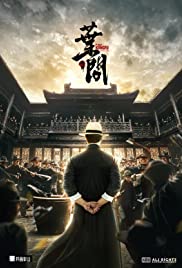
IP MAN, KUNG FU MASTER
China, 2019, 84 minutes, Colour.
Yu- Hang To, Michael Wong.
Directed by Liming Li.
Ip Man has a hallowed place in Chinese memory. He has a reputation as being a master of Kung Fu, setting up schools in mainland China, later in Hong Kong, clashing with the Japanese presence before World War II, involved in justice after the war. An important part of his reputation is his having Bruce Lee as one of his students.
For audiences wanting to see the life and career of Ip Man, there is a series of four films starring Donnie Yen in the title role, Ip Man, Ip Man 2, Ip Man 3, Ip Man 4, The Finale. (In fact, the star of this film,Yu- Hang To, had supporting roles in some of these films and seems to have been chosen for the present film because of his resemblance to Donnie Yen.)
There have been a number of spin-offs dramatising the story of Ip Man. This is one of those films, contributing to the biography but, especially, to the legend.
The setting is mainland China, the city of Foshan, before World War II. The screenplay is particularly hostile to the Japanese, their presence in China before the war, their superior intentions to incorporate China into the Japanese Empire. Definitely the villains of the drama. In the background are gangs in Foshan itself, especially a militant group, The Axes, who dominate but are opposed to the importation of opium which some of the Japanese support.
Almost immediately, there is a spectacular martial arts battle between Ip Man, surrounded by what seems to be 100 members of The Axes, all with their axes, and led by the daughter of the head of the gang. Intercut with the battle, one against 100 and winning, the audience sees the leader of The Axes playing checkers with another gang leader who is importing the opium. Their moves in the game make commentary on what is happening in the martial arts. A similar device is used later for a fight within Ip Man’s house as his wife is giving birth, intercutting the fight with Ip Man’s attempts to bring hot water to the bathroom.
The film introduces an eccentric character, a drunken man in the street, then in Ip Man’s house, who turns out to be the brother of theIp Man’s trainer. He is something of a comic character, but more than adept in fighting, becoming involved in the fights, and even becoming a power attacker on the Japanese, a mask, the Black Knight.
There are also complications in the police force, Ip Man resigning, the inauguration of the new chief seems to accommodate to the Japanese. The principal Japanese presence is a bespectacled businessman, seeming respectable but ruthless, especially in his support of the Japanese major, skilled in karate, who is to challenge Ip Man to a fight.
Which means then that the culmination is another spectacular fight, Ip Man and the Japanese, the Japanese soldiers with guns trained on the fighter, but then the turnaround with the arrival of the police.
Obviously, an entertainment, for martial arts enthusiasts.
1. The popularity of Ip Man? The four biographical films? Spin-offs with stories about his career?
2. This brief spin-off? Yu- Hang To and his guest roles in previous Ip Man films? His resemblance to Donnie Yen?
3. China and the antagonism with Japan? The Japanese presence, gangsters, opium imports, military officials, competitiveness with local martial arts groups? The film’s hostility towards Japan?
4. Ip Man in this context, his role in the police force, earnest, justice, some disgust with the chief and corruption within the police? His decision to withdraw? His relationship with his wife, her pregnancy, giving birth? Her concern about him?
5. His martial arts skills, Kung Fu, the contrast with Karate? The narrative the film interspersed with fights, the choreography, the editing, the pace? The intercutting of the different fights with alternative action? The first with the two men playing checkers and trying to outwit each other? The second fight in the house, his wife giving birth, trying to get the hot water to the room?
6. The drunk man on the street, giving the message to Ip Man, his presence in the house, drinking the wine, observing? The conversation between him and Ip Man, the promise of the wine? The competitiveness, the fight? The drunk man being the brother of the Master? His support of Ip Man? His intervention is the Black Knight?
7. The role of the gang in Foshan? The Axes? The leader, his daughter, the vast squad attacking Ip Man, with their axes, Ip Man and his vanquishing the group, the daughter? Her father, his position, his being anti-drugs, killing his opponent? Going to jail – and his death in the jail? Later revealed as murder by the Japanese?
8. The chief, his taking over, seeming subservience, Ip Man’s reaction? In the cell? The later revelation of the plan to confront the Japanese? The Chief reappearing, supporting Ip Man?
9. Ribby, loyalty to Ip Man, in the house, support, with the Japanese, the plan with the Chief, the plan to poison Ip Man? The Japanese killing Ribby and throwing him over the balcony?
10. The Japanese leader, calm, spectacles, control, the murder in the jail? The Japanese major, his Karate skills, the buildup to the confrontation with Ip Man?
11. The spectacular fight, the Japanese warriors with the guns, the arrival of the chief, the local police, the reversal of roles?
12. The daughter, her venom towards Ip Man, learning the truth, change of heart, her taking the Japanese and killing him?
13. An episode in the legends about Ip Man?
Karate Kid, Part 3, The
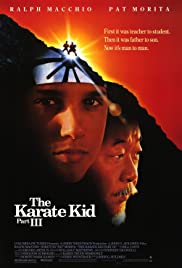
THE KARATE KID III
US, 1999, 111 minutes, Colour.
Ralph Macchio, Pat Morita, Robyn Lively, Thomas Ian Griffith, Martin Kove, Sean Cannan, Jonathan Avildsen.
Directed by John G. Avildsen.
This is the third in the franchise of The Karate Kid, the first two films being very popular, introducing Ralph Macchio as Daniel, and Pat Morita as Mr Miyagi, his trainer. In the past films they clashed with the head of another martial arts school, John Kreese, played by Martin Kove.
In this film, Kreese has lost his students, teams up with an old friend, Terry Silver (Thomas Ian Griffith) and they plan revenge on Daniel and Mr Miyagi. Kreese goes to Tahiti to recuperate and the word goes round that he is dead.
In the meantime, Daniel and Mr Miyagi have returned from a tournament, the house destroyed by developers, Daniel giving his funds to Mr Miyagi to set up a bonsai shop. This attracts attacks from Silver and his thug cronies. There is pressure on Daniel to join a tournament but he refuses. There are quite some complexities, the destruction of the bonsai, threats to Daniel and Jessica (whom he has met at a club and is attracted to). Daniel is also involved in a fight in the club.
There is tension between Daniel and Mr Miyagi but all is resolved, the buildup to a final tournament where Daniel is to be destroyed, his turning the tide during the fight – defeat for the villains, happy ever after.
This film was not as popular with the public as the previous two films. There was a feature, The Karate Kid with Hilary Swank in the title role. There was also a remake with Jaden Smith, Will Smith’s son.
1. The popularity of the first two films? Audience expectations? The same credits in writing, direction, Bill Conti’s score?
2. The initial tension? John Kreese, his students, antagonism towards Daniel and Miyagi, his friendship with Terry Silver, toxic waste disposal, their discussions, planning revenge, Kreese reported dead?
3. Daniel and Miyagi, return home from the tournament, the home destroyed, Daniel homeless, giving his funds to Miyagi, the bonsai shop? Daniel’s mother caring for the uncle in New York? His meeting with Jessica, the attraction?
4. Mike Barnes, the challenge, Snake and Dennis, the plot against Daniel and Miyagi? Challenging Daniel to a tournament? Daniel firm, refusal?
5. The lies about Krease? The bonsai plant, the destruction, digging up the tree, Daniel and Jessica, the threats and the rope, Daniel forced to sign? And his clashing with Miyagi?
6. Silver, offering to training Daniel, the moves, mockery?
7. The night club, the fight, Daniel, apologies?
8. Kreese’s arrival, the truth, the attack? Miyagi refusing to help Daniel?
9. Daniel, the buildup to the fight, the thugs and their approach, the plan for Barnes to win, Daniel turning the Tide, winning?
10. The vindication of the Karate Kid?
Importance of Being Oscar, The
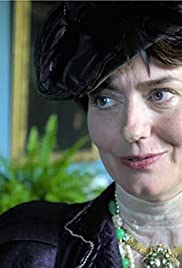
THE IMPORTANCE OF BEING OSCAR
UK, 2018, 84 minutes, Colour.
Anna Chancellor, Anna Devlin, James Fleet, Freddie Fox, Ben Lloyd- Hughes, Alice Orr -Ewing, Nicholas Rowe, Ed Stoppard.
Directed by Richard Curson Smith.
This is a very interesting and entertaining introduction to the life and career of Oscar Wilde. But, it is also interesting and entertaining for those familiar with Wilde and his work.
The narrative informs us about Wilde and his Irish background, his coming to England, his family background, his self-image and his promotion of himself. The narrative becomes more expensive as Wilde is sent on a visit to the United States, charms his audiences, returns full of confidence, the success of his career, the editing of Women’s World, his writing essays, especially The Decay of Lying.
There is a good range of talking heads, experts on Wilde, authors of biographies and studies, the theatre director, Dominic Dromgoole, Stephen Fry, and comments from Wilde’s grandson, Merlin Holland. Many of their comments are illuminating about Wilde, his character, his talent, his way with words, his theories about the perfection of beauty, his crises.
Throughout the film there are quite a number of photos of Wilde and his family, of Lord Alfred Douglas, of the Marcus of Queensbury, of newspapers, of cartoons, theatre programs…
But what is distinctive about this film is that there are extensive dramatisations of his plays, and of aspects of his life.
There is an excellent assembly of actors performing in the excerpts from the plays, taking up several roles from the different plays. There is also a motif throughout the film, actor Nicholas Rowe portraying Wilde himself, looking into three mirrors, and speaking a variety of aphorisms and quotations from Wilde himself.
Wilde was challenged to do something creative in 1890, and the result was The Picture of Dorian Gray – with some dramatisations of the painting of the portrait, the challenge to Gray himself, and a return at the end to his destruction of the portrait. Each of the four major social comedies of manners is set in their context between 1891 and 1896. And, there are also excerpts from Salome.
And, during the first half of the 1890s, there is a focus on Wilde himself, his sexuality, his relationship with his wife, Constance, and their children, even reading them fairytales – and the context for his stories, The Canterville Ghost and The Happy Prince.
The narrative also explains the context of the rent boys and the male prostitutes in London, his connection with Alfred Lord Douglas and Douglas staying with the family, Constance approving, not realising the nature of the relationship. There are the ups and downs in the relationships, Douglas pleading with Constance to get Wilde to write to him, the reconciliation, suggestions about the unbalanced nature of Lord Douglas.
There is some background to the Marcus of Queensbury and his attitudes, his wanting to upset the premiere of Earnest, the famous card with its misspelling. Wilde made bad judgements about suing the Marcus of Queensbury, the nature of the charges (and the strict legislation of the 1890s about homosexual associations)), losing his case, two years hard labour in Reading gaol, some information about his subsequent time in Europe and some quotations from De Profundis.
The film is particularly interesting in its comments about Wilde and his plays and how each of them contributed to what was happening in his own life, in relationships, in deception, double standards… The comments make a very good case – and it is, of course, the same with Dorian Gray, the open facade, the ageing portrait in the attic, the eventual coming to light of the portrait and its destruction.
This film can certainly be recommended for those interested in knowing more about Wilde and understanding his work and his life.
Wilde has being portrayed on screen by Robert Morley, Peter Finch, Stephen Fry, and, in The Happy Prince, by Rupert Everett.
Soul of America, The
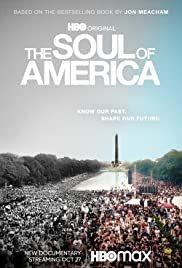
THE SOUL OF AMERICA
US, 2020, 80 minutes, Colour.
Directed by K.D.Davison.
This is an excellent American documentary. It was released in 2020, seen widely at the time of the US presidential election campaigns. It offers an opportunity to listen to the ideas of an eminent American journalist, formerly editor of Newsweek, Jon Meacham. He had published his book, The Soul of America – at the Battle for our Better Angels. And this documentary dramatises not just his opinions but he episodes in American history that he sees as keynote challenges, challenges for change.
Directed by K.D.Davison (Katie Davison), the structure of the documentary is exemplary. It is personalised initially by seeing Meacham at his home, getting ready to go on lecture tours, a pleasant introduction to him as a person ready to listen to his opinions). Throughout the film we see him at studios being interviewed, at universities and other institutions giving lectures, some encounters with the audience afterwards. He is talking head that we are interested in – and, probably, like.
There is a summary of his historical background, early years as a journalist in Chattanooga, his moving to Newsweek, becoming Editor in Chief, his books and writing. A Republican supporter at the time of Ronald Reagan’s election in 1981, an observer of the American ethos in the four decades which follow, some implicit criticisms of Donald Trump and his presidency rather than an attack on him.
The Soul of America capitalises on the advantages of images, moving images, historical footage, to give more reality and meaning to the words and commentary. Several episodes in American history have singled out, well illustrated by the footage of the times, with some expert and personal comment from witnesses. They range from the suffragist movement in the United States, the leaders, the demonstrations, the hostility, the role of Woodrow Wilson to contemporary American life and the frightening statistic that in the 1960s, popular support for government leadership was 77% while the contemporary statistic is a mere 17%.
The film shows the aftermath of the depression, result and his vision, his collaboration with interested parties, his handling of the transition from neutrality in World War II to the post Pearl Harbor declaration of war. One of the very interesting episodes dramatised, with quite a lot of footage which elicits audience compassion and grief is the internment of the Japanese Americans during World War II (something which the Liberal Roosevelt ordered). The witnesses about their experience include the Star Trek activist, George Takei.
The Kennedy years, brief as they were, illustrate Meacham’s points, Eisenhower advising John F. Kennedy, after the Bay of Pigs, to do consultation before making decisions, seen with the 13 Days and the missiles of October. There is also the Civil Rights legislation, Lyndon Johnson’s decision to follow through, collaboration with Martin Luther King, the defiance taunts slavery turned into segregation in the South, and many alarming pictures from the 1920s to the 1960s Ku Klux Klan members marching, even along Pennsylvania Avenue.
An interesting illustration is, surprisingly, from George H.Bush, not rushing to the Berlin wall as people thought he should, but, rather, giving Gorbachev and Glasnost some space so that the two could sign agreements after the collapse of the Soviet Union.
Meacham makes us realise that the 21st-century present situation has had many parallels in the past, some even worse than the present divisiveness in the United States. So, this is an intriguing, interesting and challenging documentary. And Meacham quotes Mark Twain stating that history does not necessarily repeated itself – but it rhymes!
Jungle Street/ Jungle Street Girls
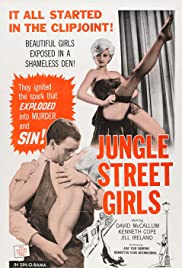
JUNGLE STREET/JUNGLE STREET GIRLS
UK, 1960 , 75 minutes, Black-and-white.
David Mc Callum, Jill Ireland, Kenneth Cope, Brian Weske, Edna Dore, Thomas Gallagher, Martin Sterndale, John Chandos.
Directed by Charles Saunders.
A brief British drama of 1960, a time when there was a focus in British theatre and screen on “kitchen sink� themes, a focus on ordinary people, working class people, their problems, their day-to-day lives.
It is surprising to see how much running time is given to striptease acts in a sleazy little club, not in Soho, but, apparently, in Shepherd’s Bush. It is the Adam and Eve Club. (One presumes this was provocative enough at the time, single acts of striptease, more suggestive than complete, nothing compared with the frequency of pole dancing in subsequent cinema.)
The film focuses on an angry young man, Terry Collins, not just with a chip on his shoulder but a huge log, continually aggressive, but also passive-aggressive at home and with his friends. The film opens with him attacking an old man in a side street, wanting to rob him, but actually killing him. He is also seen at home, his mother devoted to him, his hard-working drinking father continually criticising him, threatening violence towards him. He is seen working at a garage. But, he spends a lot of time at the Adam and Eve Club, talking with the lecherous boss, with the manager who has been in jail but who realises that he is the killer of the old man, especially when he is interrogated by the police. He tries blackmail on the young man.
In the meantime, a robber who is good at safe breaking, Johnny, Kenneth Cope, gets out of jail, goes to see Terry Collins, who was abandoned him after Johnny took the fall, goes to see his former girlfriend, Sue, who is both faithful and fickle.
The main action concerns robbing the club safe, Terry scoping it out, Johnnie agreeing, then knocking out one of the security men, succeeding in blowing the safe, but the security man, tied up, is able to set off the alarm. The final drama consists of Terry bludgeoning Johnny so that he is caught. Johnny gives up Terry who has gone to confront Sue. There is some pathos when the tailor, who lives opposite Sue, intervenes and is accidentally shot, with his comment about old men and their being disposable by the young.
The film is marked by the appearance of David Mc Callum, giving a somewhat overwrought performance as Terry Collins, no redeeming features whatsoever. His wife of those years, Jill Ireland, is Sue.
Not a particularly good film, B-budget, a touch of the lewd, a comment on the criminal mentality of the 1950s into the 1960s.
Aviso, L'/ The Warning
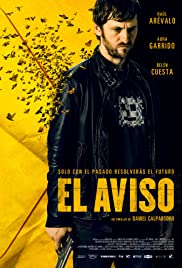
AVISO, L' /THE WARNING
Spain, 2018, 93 minutes, Colour.
Raul Arevalo, Aura Garrido, Hugo Abues, Belen Cuesta, Antonio Dechent..
Directed by Daniel Calpasoro.
An interesting Spanish thriller and the audience has to keep attentive as to what is going on, especially the continuity between different time periods.
The film opens with a shooting in a 24 hour service station. Jon, ,Raul Arevalo, is distraught when his best friend, David, is shot. However, he goes into coma, and goes through surgery.
In the meantime, the action goes forward 10 years to 2018, the focus on a 10-year-old boy and his mother, their lives at home, his being bullied at school, his visits to the 24 hour service station, forced to steal a porn magazine for the bullies, but discovered by the friendly manager. The boy receives a note warning him to avoid the 24 hours service station on his birthday or he will be killed.
Throughout the action, the film moves from 2008 to 2018, backwards and forwards – with a flashback to deaths in 1976, 1955, 1913, all of the same site. Jon who is a mathematical genius starts to investigate each episode, discovering the same number of people there, people are the same age as – and he works out that a 10-year-old boy will be killed in 2018. He has delivered a note with the manager to warn the boy – and the manager has sent it to Nico. However, Nico’s mother is sceptical.
Jon interviews various people to get information about the 1913 massacre, the son of the victim in 1955, a witness to the terrorist action in 1976. Ultimately, when David is getting better, Jon realises that he was the intended victim and, by the mirror outside the service station, he is able to communicate with Nico, urging him to run, and Jon himself dying to save Nico.
The film moves at quite a pace, contrasting Nico and his mother and their ordinary life with Jon and his frantic investigations as well as the tension in the hospital during the operation and the decision then to turn off David's life support.
1. The title? The note for Nico? The date, the place, the warning about his death?
2. Madrid, the city, the vistas, the buildings, the streets, apartments, service stations, the school? Hospitals? Maternity ward? The musical score?
3. The plausibility of the plot? The touch of the supernatural? The one location, bank, service station? The deaths, 1913 massacre, family betrayal situation in 1955, 1976 and the terrorism, 2008 and the drive-by shooting, 2018 and the robbery?
4. Jon, mathematical genius, the formulae on the blackboard, his interest in the mathematics of the statistics, five people present, their respective ages, the similarities, the 10-year-old boy? Each murdered person incarnate on the day of the killings? The continuity?
5. Jon, driving, Andrea and the ice, picking up David, the discussions, trip to Paris, the engagement, Jon and his past relationship with Andrea? At the 24 hours, the shooting, Jon going in, David dead, the proprietor, calling the ambulance and police?
6. The continuity of the 2008 sequences, the hospital, the doctors, David and his condition, deteriorating, the artery and the brain, the possibility of surgery, his going downhill, the issue of turning off life support, Andrea and her refusal, the brother, the parents? Andrea's ringing Jon?
7. Jon, his research, interviewing people, the survivors, the old lady with the information about the massacre, the son of the murdered woman in 1955, the garage witness about 1976?
8. Nico and his mother, ordinary themes, the ex-husband, Nico bullied at school, to buy the porn magazine, the tough boys, his attempt to steal, the proprietor of the 24-hour, the mother concerned? His mother seeing Nico in the yard? Her complaints to the principal, the discussions, her anger? Nico and the boys, photographing him in the toilet and the threat? Sara, her friendship, life at home, life at school?
9. The note and warning, the proprietor at the shop, the mother confronting him, and not believing the note? Nico and his fear, the other boy not going, the mother going to confront the parent, no truth? Nico not wanting to go to the 24-hour, his mother's insistence, his birthday, the cake, his hiding in the back of Sara's car, going to the principal, Sarah's mother and her apology?
10. Eventually going to the store, to get the magazine, the others in the store, the manager? The thug with his gun, preparing for the robbery?
11. Jon and his theory, going to the maternity ward for any child born on the day? The film showing Nico's birth, his mother late, Nico being the inheritor?
12. Andre's continued desperation, the turning off of the life support, her phone calls to Jon, her frantic visit to him?
13. The effect of intercutting 2008 and 2018? Jon, becoming more desperate, his pills, schizophrenia, talking with the medical authorities? His frustration? The realisation of the incident on 2 April and David to die on 12 April? The common date?
14. His realisation that he was meant to be the victim rather than David? His trying to warn Nico? The mirror outside the 24-hour? Nico appearing to Jon, Jon appearing to Nico? Jon urging him to run?
15. The robber, the shooting, the associate on the bike? Jon, his death, Nico saved, going back to his mother? David revising?
16. Irrespective of the plausibility of the plot, the enjoyment of the characters, the situation, the tension?